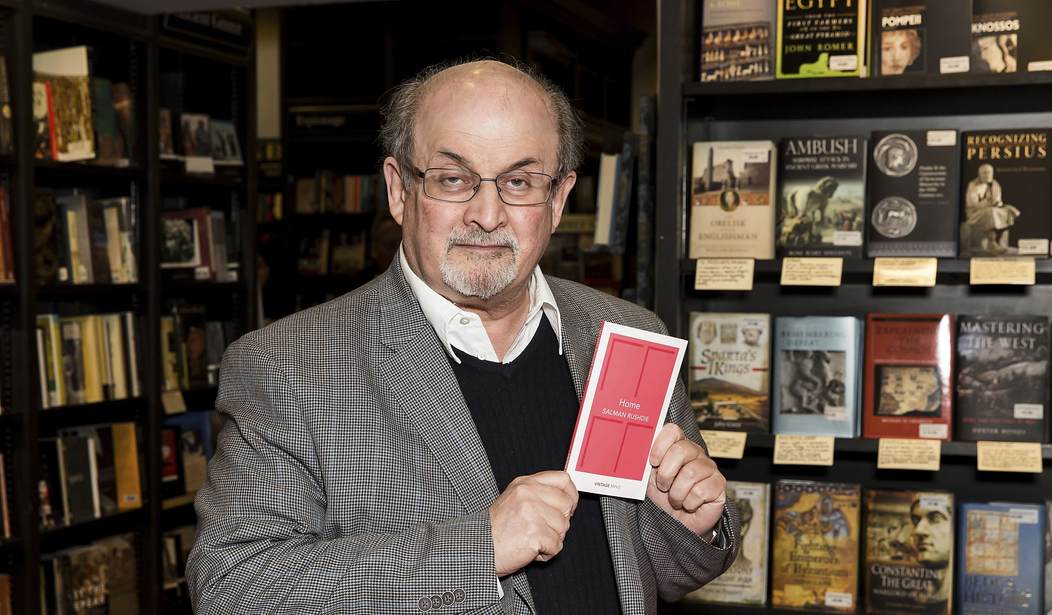The stabbing of Salman Rushdie by an open supporter of the Islamic Republic of Iran, who ingenuously explained that he attacked the famed writer because he “insulted Islam,” has put much of the Leftist intelligentsia in the West in a tough position. For years they’ve been insisting that any criticism of Islam, including any opposition to jihad violence, is “Islamophobic.” Even to stand against Sharia oppression of women is to manifest a “white savior complex.” Yet now the world’s most renowned insulter of Islam has been critically injured for it. How can a good Leftist stand with Rushdie and yet maintain his or her or xis credentials as a staunch foe of “Islamophobia”? The New Yorker has come to the rescue.
Longtime New Yorker staff writer Adam Gopnik begins by declaring that the attack on Rushdie was “triply horrific to contemplate,” because of its “sheer brutality and cruelty,” as well as “in the madness of its meaning and a reminder of the power of religious fanaticism to move people,” and “because it had seemed to those who knew him that the fatwa had faded in significance and threat.” Gopnik is most intent, however, on demonstrating that the attack didn’t even have the justification of being a response to blasphemy against Islam because Rushdie hadn’t really insulted Islam at all.
Gopnik thus notes that “the evil absurdity of the death sentence pronounced on Rushdie for having written a book actually more exploratory than sacrilegious—in no sense an anti-Muslim invective, but a kind of magical-realist meditation on themes from the Quran—was always obvious.” Gopnik then hastens to assure us that he doesn’t mean that Rushdie deserved to be attacked if he had actually written an “anti-Muslim invective: “Of course, Rushdie should have been equally invulnerable to persecution had he written an actual anti-Muslim—or an anti-Christian—diatribe, but, as it happens, he hadn’t.” OK, fine — but despite the fact that he has made his point, Gopnik continues to go out of his way to emphasize that neither Rushdie nor The Satanic Verses are anti-Islam.
The New York article then invokes Seyed Mohammad Marandi, “a figure involved in the U.S.-Iran nuclear negotiations,” who “announced on Twitter that he ‘won’t be shedding tears for a writer who spouts endless hatred & contempt for Muslims & Islam.’” Gopnik adds: “Of course, Rushdie did no such thing.”
Right. And not only that, but “we met when we walked through the great 1992 Matisse show at moma together, at the height of the threat, and he was full of delight in each painting as it passed, with a nice, fully developed if slightly ironic sense of how much Matisse had drawn on Islamic civilization, on Persian ornaments and North African textiles, for his inspiration.” So not only is Salman Rushdie not an “Islamophobe,” but Gopnik tells us this to show that Rushdie positively admires Islam and Islamic culture, with the unspoken “Isn’t that wonderful?” hovering in the air above the text.
Related: Why Does the Left Have Such a Difficult Time With the Concept of ‘Free Speech’?
Nonetheless, this poor man has been and will be accused of insulting Islam: “Efforts will be made,” Gopnik writes unhappily, “are bound to be made, to somehow equalize or level the acts of Rushdie and his tormentors and would-be executioners—to imply that though somehow the insult to Islam might have been misunderstood or overstated, still one has to see the insult from the point of view of the insulted. This is a doubly despicable viewpoint, not only because there was no actual insult offered but also because the right to be insulting about other people’s religions—or their absence of one—is a fundamental right, part of the inheritance of the human spirit. Without that right of open discourse, intellectual life devolves into mere cruelty and power seeking.”
Gopnik even strikes out at a core claim of the contemporary Left: “The idea—which has sprung to dangerous new life in America as much on the progressive as on the theocratic side of the argument—that words are equal to actions reflects the most primitive form of word magic, and has the same relation to the actual philosophy of language that astrology has to astronomy. Sticks and stones really can break bones.”
The import of all this is clear. Gopnik is not saying that those who do write “anti-Muslim invectives” should not be allowed to publish, or that they should be subjected to violence. I don’t know of any such books, anyway; mine are only characterized as such by those who have not read them and would never dare to do so. But the thrust of what he is saying is that the authors of such invectives should be safe but that they will never be celebrated in the New Yorker. Gopnik can only make Salman Rushdie palatable to his far-Left audience by showing that Rushdie did not insult Islam and in fact holds it in high regard. Otherwise, he would only have ever been mentioned in the New Yorker in the course of some condemnation of “Islamophobia.”
If, however, Rushdie had produced a sacrilegious anti-Christian invective, the New Yorker would have no trouble hailing and lauding him, even in the absence of any threats or assassination attempts. It has been fun watching the censorious, authoritarian, and Islamophilic Left tie itself into knots defending the freedom of speech it otherwise despises in the wake of the stabbing of Salman Rushdie, but its sinister attempt to silence its critics and its unctuous hypocrisy are abundantly on view in this New Yorker piece and elsewhere.










Join the conversation as a VIP Member